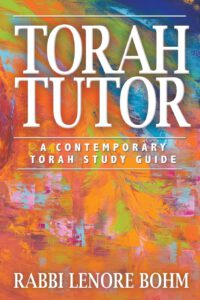.
By RABBI LENORE BOHM
Author of Torah Tutor
EVENING OF FRIDAY, AUGUST 26—My favorite Hebrew month is about to begin. It is called Elul and it leads up to the Jewish New Year, Rosh Hashanah.
I love Elul because it is all about reflection and discernment: How has the past year impacted me? Is my heart more open or closed? Are my boundaries more elastic or rigid? Have my relationships become more transactional or have they deepened? Have I laughed and embraced more or less frequently this year? Has abundance or scarcity been my starting point in my quest to be a generous person?
The list of questions goes on and I love them all. They release me from the accrued pettiness of the year coming to an end.
Elul reveals not what we want but what we need: spiritual grounding. Elul invites us to take seriously that obscure feeling of something lacking, of something being amiss. Elul suggests we name and place front and center the desire to be at home in our selves and in our lives. Slow down, Elul begs; what is the goal, the finish line you are striving so hard to reach?
Here is the crux of the matter as articulated in The Spiritual Life by Evelyn Underhill (1875-1941), a prolific British writer on mysticism and spiritual growth:
“We mostly spend our lives conjugating three verbs: to Want, to Have and to Do. Craving, clutching, and fussing, on the material, political, social, emotional, intellectual–even on the religious–plane, we are kept in perpetual unrest … But when we widen our horizon … a new coherence comes into our existence, a new tranquility and release.”
Elul is about widening our horizons and releasing our dis-eases and our mis-takes.
Each morning of Elul, we hear the sound (the cry) of the shofar. It is supposed to serve as a wake-up call to stir us out of our reverie and apathy. How have I grown complacent? What duties have I neglected? Can I reconcile my behavior with my values?
The idea isn’t to feel guilt or shame. It’s to promote self-awareness and renewal. If I want this year to be different, will I choose to be different? Free will is at the heart of the High Holy Day enterprise. I can choose to speak more, to chatter less, to (for)give more, to withhold less, to reveal more than revile, to be less certain, less judgmental, to open more widely my heart, my mind, my hands, my eyes, my doors.
Along with hearing the shofar, another custom of Elul is to recite Psalm 27 morning and evening. Psalm 27 is an interesting choice (made apparently in the 1700s) to accompany Elul. It is not a paean to God’s forgiving nature or love of humanity. The psalm does not demonstrate singular and unbending faith on the part of the author. To the contrary: Psalm 27 is full of uncertainty and apprehension. The psalmist hopes God will respond, but there is no conviction.
Why would this psalm be chosen to accompany Elul, a month preoccupied with preparation and self-accounting (called “cheshbon hanefesh”)?
I think this choice speaks to an appreciation of honesty as the linchpin of this month’s self-assessment. Not pretend piety or sanctimony, but truth-telling. Have I or haven’t I? Did I or didn’t I?
I love Elul because pretending makes me uneasy. Not that I don’t to it, but I’m always regretful when I do, and Elul won’t let me get away with it. The early spring holiday of Purim invites us to mask ourselves and to engage in parody. Elul, some six months later, incentivizes unmasking and frank, unpretentious confrontation of self.
Returning to this season is like letting go of a tightly held breath.
I release it and it releases me.
.
.
Meet Rabbi Lenore Bohm …
 VISIT RABBI LENORE’S RESOURCE PAGE: Go to TorahTutorBook.com to find more information about her ongoing work and her new book.
VISIT RABBI LENORE’S RESOURCE PAGE: Go to TorahTutorBook.com to find more information about her ongoing work and her new book.
Rabbi Lenore Bohm began her career among the first wave of women ever ordained as rabbis. Drawing on a lifetime of teaching the Torah to groups of adults, Bohm divides her book into the 54 portions read each year from the Torah, which are the first five books of the Hebrew Bible. This is a perfect book for individual reading or small group discussion.
Order a copy of her new book from Amazon.
from Religious Holidays https://ift.tt/OXQ5igc

 :: Unlock Your Success with Our Digital Course →
:: Unlock Your Success with Our Digital Course →














No comments:
Post a Comment